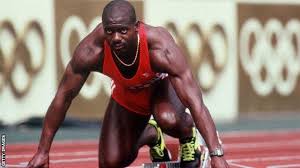In the pantheon of sports legends, few stories are as electrifying and cautionary as that of Ben Johnson. At his peak, Johnson was the fastest man on Earth, a national hero in Canada, and a symbol of human speed. But his meteoric rise was matched by an equally dramatic fall when he was stripped of his 1988 Olympic gold medal for doping one of the most infamous scandals in Olympic history.
Ben Johnson didn’t just break records. He shattered the world’s illusions about clean competition and changed the way we view performance-enhancing drugs (PEDs) in elite sport forever.
The Rise of a Canadian Star
Born in Jamaica and raised in Canada, Ben Johnson began sprinting competitively in the late 1970s. His breakout came in the early 1980s as he began challenging the world’s fastest sprinters on the international stage. By 1985, Johnson was one of the top sprinters globally, and by 1987, he was a full-blown phenomenon.
At the 1987 World Championships in Rome, Johnson stunned the world by running the 100 meters in 9.83 seconds, setting a new world record and beating American rival Carl Lewis. Canada celebrated him as a national treasure a soft-spoken immigrant who had worked tirelessly to become the best in the world.
The 1988 Seoul Olympics: Triumph and Tragedy
The defining moment of Ben Johnson’s career came at the 1988 Olympic Games in Seoul. In the 100m final, he exploded out of the blocks and powered through the finish line in 9.79 seconds a new world record and a dominant win over Carl Lewis and other top competitors.
The victory was hailed as one of the greatest sprint performances in history until it all unraveled.
Just 48 hours later, the shocking news broke: Johnson had tested positive for stanozolol, an anabolic steroid. He was stripped of his gold medal and world record, and sent home in disgrace. The sports world was stunned. Johnson, once the pride of a nation, had become the face of betrayal and the poster child for doping in athletics.
How Ben Johnson Changed the Game
Despite the scandal, Johnson’s fall had a lasting impact on the world of sport perhaps even more profound than his rise.
1. The Wake-Up Call for Anti-Doping
Before Johnson’s disqualification, performance-enhancing drug use was a whispered rumor in elite sport. His positive test brought the issue into the global spotlight and forced organizations like the International Olympic Committee (IOC) and the International Association of Athletics Federations (IAAF) to take doping seriously. It led to stricter testing protocols, the founding of WADA (World Anti-Doping Agency), and a new era of vigilance.
2. Revealing a Broken System
The 1989 Dubin Inquiry launched in Canada after Johnson’s positive test revealed widespread doping among athletes, coaches, and sports federations. Johnson himself admitted that steroid use had been common practice in elite track and field. His case exposed the systemic nature of the problem, showing the world that doping wasn’t just the decision of individual athletes but often part of a broader culture.
3. Redefining Athletic Heroism
Ben Johnson’s story also changed how we define greatness. The public began to question not just how fast or strong an athlete was, but how they achieved it. The emphasis shifted from pure performance to integrity and transparency. Johnson’s fall helped spark a more nuanced view of what it means to be a sports icon.
Legacy: A Cautionary Tale
Ben Johnson attempted several comebacks in the 1990s but never regained his former glory. His name remains synonymous with doping a symbol of both athletic brilliance and the dark side of competitive pressure.
Yet, his story is essential. Johnson didn’t just change the 100-meter dash; he forced a global reckoning about fairness, ethics, and the cost of chasing perfection.
The Man Who Forced Sport to Confront Its Demons
Ben Johnson will always be remembered as the man who flew too close to the sun who captured the world’s attention with impossible speed, only to be undone by the truth behind it. His rise and fall didn’t just shake the track world; it reshaped it.
He remains one of sport’s most controversial figures not for what he accomplished, but for what he revealed. In that, perhaps, lies his greatest and most lasting impact.

